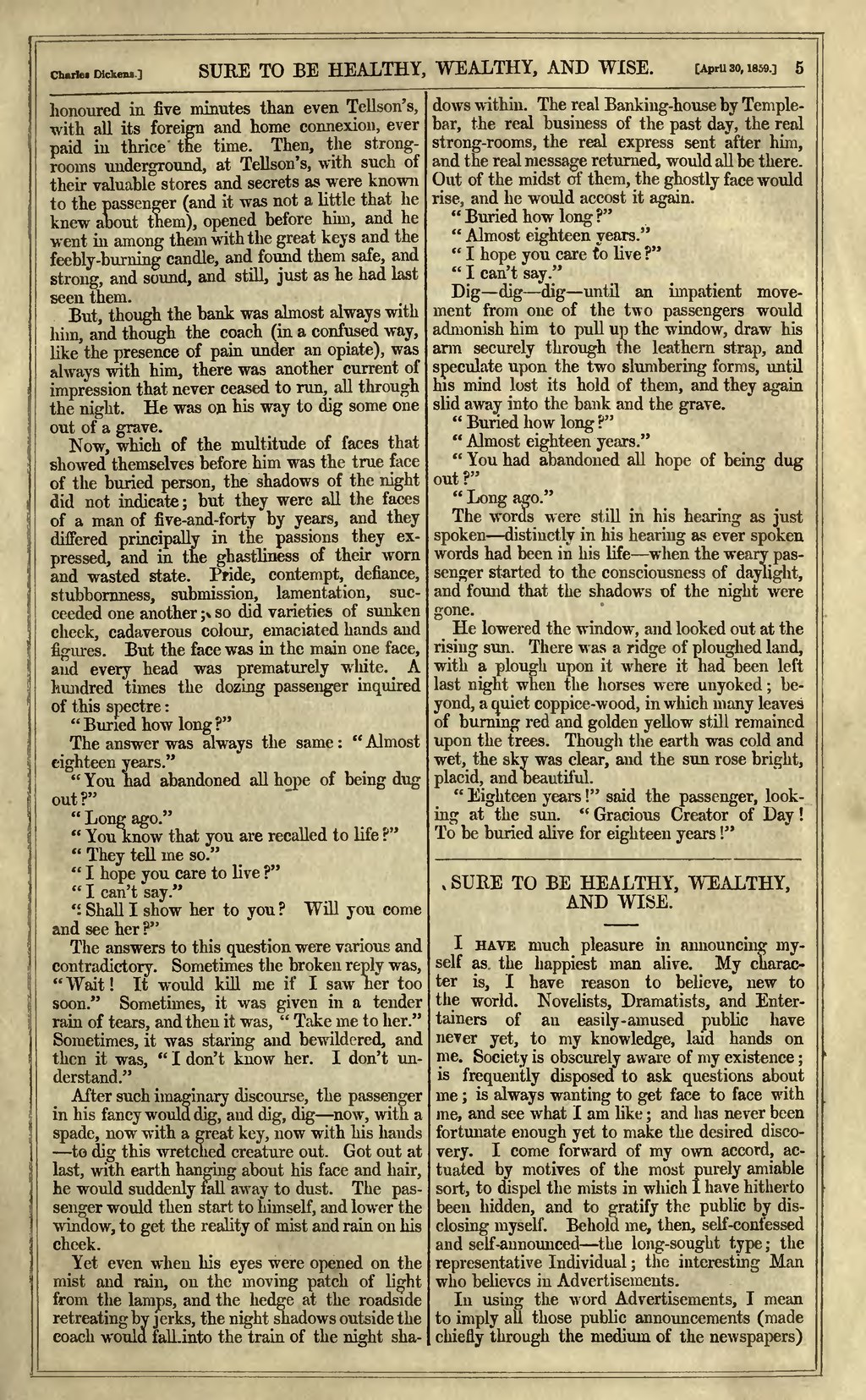honoured in five minutes than even Tellson's, with all its foreign and home connexion, ever paid in thrice the time. Then, the strongrooms underground, at Tellson's, with such of their valuable stores and secrets as were known to the passenger (and it was not a little that he knew about them), opened before him, and he went in among them with the great keys and the feebly-burning candle, and found them safe, and strong, and sound, and still, just as he had last seen them.
But, though the bank was almost always with him, and though the coach (in a confused way, like the presence of pain under an opiate), was always with him, there was another current of impression that never ceased to run, all through the night. He was on his way to dig some one out of a grave.
Now, which of the multitude of faces that showed themselves before him was the true face of the buried person, the shadows of the night did not indicate; but they were all the faces of a man of five-and-forty by years, and they differed principally in the passions they expressed, and in the ghastliness of their worn and wasted state. Pride, contempt, defiance, stubbornness, submission, lamentation, succeeded one another; so did varieties of sunken cheek, cadaverous colour, emaciated hands and figures. But the face was in the main one face, and every head was prematurely white. A hundred times the dozing passenger inquired of this spectre:
"Buried how long?"
The answer was always the same: "Almost eighteen years."
"You had abandoned all hope of being dug out?"
"Long ago."
"You know that you are recalled to life?"
"They tell me so."
"I hope you care to live?"
"I can't say."
"Shall I show her to you? Will you come and see her?"
The answers to this question were various and contradictory. Sometimes the broken reply was, "Wait! It would kill me if I saw her too soon." Sometimes, it was given in a tender rain of tears, and then it was, "Take me to her." Sometimes, it was staring and bewildered, and then it was, "I don't know her. I don't understand."
After such imaginary discourse, the passenger in his fancy would dig, and dig, dig—now, with a spade, now with a great key, now with his hands—to dig this wretched creature out. Got out at last, with earth hanging about his face and hair, he would suddenly fall away to dust. The passenger would then start to himself, and lower the window, to get the reality of mist and rain on his cheek.
Yet even when his eyes were opened on the mist and rain, on the moving patch of light from the lamps, and the hedge at the roadside retreating by jerks, the night shadows outside the coach would fall into the train of the night shadows within. The real Banking-house by Temple-bar, the real business of the past day, the real strong-rooms, the real express sent after him, and the real message returned, would all be there. Out of the midst of them, the ghostly face would rise, and he would accost it again.
"Buried how long?"
"Almost eighteen years."
"I hope you care to live?"
"I can't say."
Dig—dig—dig—until an impatient movement from one of the two passengers would admonish him to pull up the window, draw his arm securely through the leathern strap, and speculate upon the two slumbering forms, until his mind lost its hold of them, and they again slid away, into the bank and the grave.
"Buried how long?"
"Almost eighteen years."
"You had abandoned all hope of being dug out?"
"Long ago."
The words were still in his hearing as just spoken—distinctly in his hearing as ever spoken words had been in his life—when the weary passenger started to the consciousness of daylight, and found that the shadows of the night were gone.
He lowered the window, and looked out at the rising sun. There was a ridge of ploughed land, with a plough upon it where it had been left last night when the horses were unyoked; beyond, a quiet coppice-wood, in which many leaves of burning red and golden yellow still remained upon the trees. Though the earth was cold and wet, the sky was clear, and the sun rose bright, placid, and beautiful.
"Eighteen years!" said the passenger, looking at the sun. "Gracious Creator of Day! To be buried alive for eighteen years!"
SURE TO BE HEALTHY, WEALTHY, AND WISE.
I have much pleasure in announcing myself as. the happiest man alive. My character is, I have reason to believe, new to the world. Novelists, Dramatists, and Entertainers of an easily-amused public have never yet, to my knowledge, laid hands on me. Society is obscurely aware of my existence; is frequently disposed to ask questions about me; is always wanting to get face to face with me, and see what I am like; and has never been fortunate enough yet to make the desired discovery. I come forward of my own accord, actuated by motives of the most purely amiable sort, to dispel the mists in which I have hitherto been hidden, and to gratify the public by disclosing myself. Behold me, then, self-confessed and self-announced—the long-sought type, the representative Individual; the interesting Man who believes in Advertisements.
In using the word Advertisements, I mean to imply all those public announcements (made chiefly through the medium of the newspapers)
